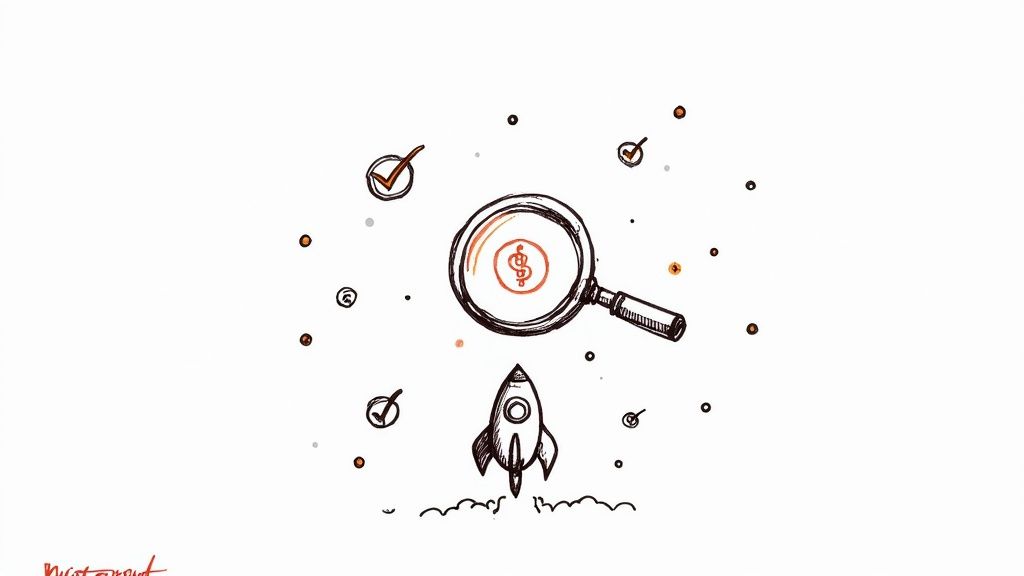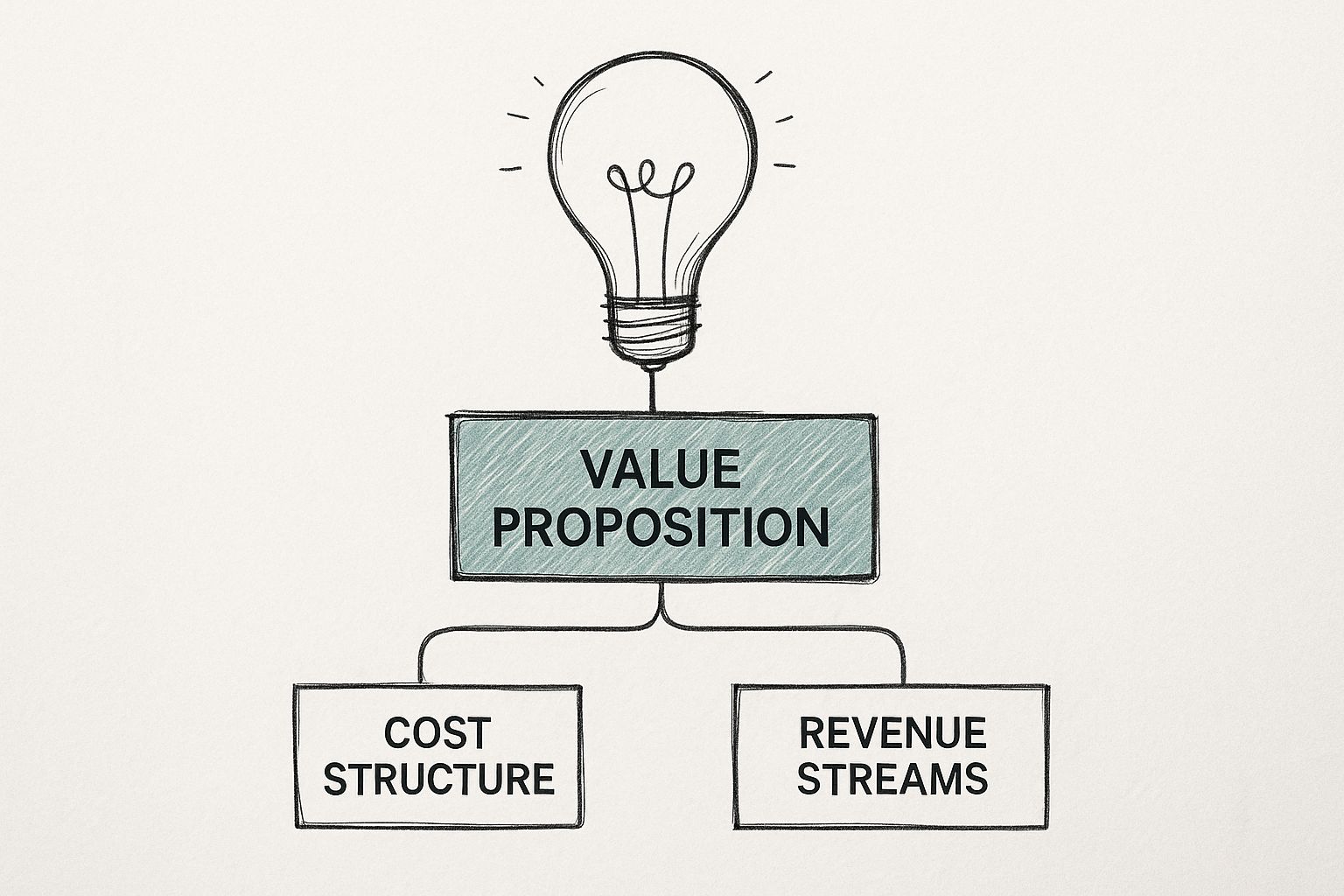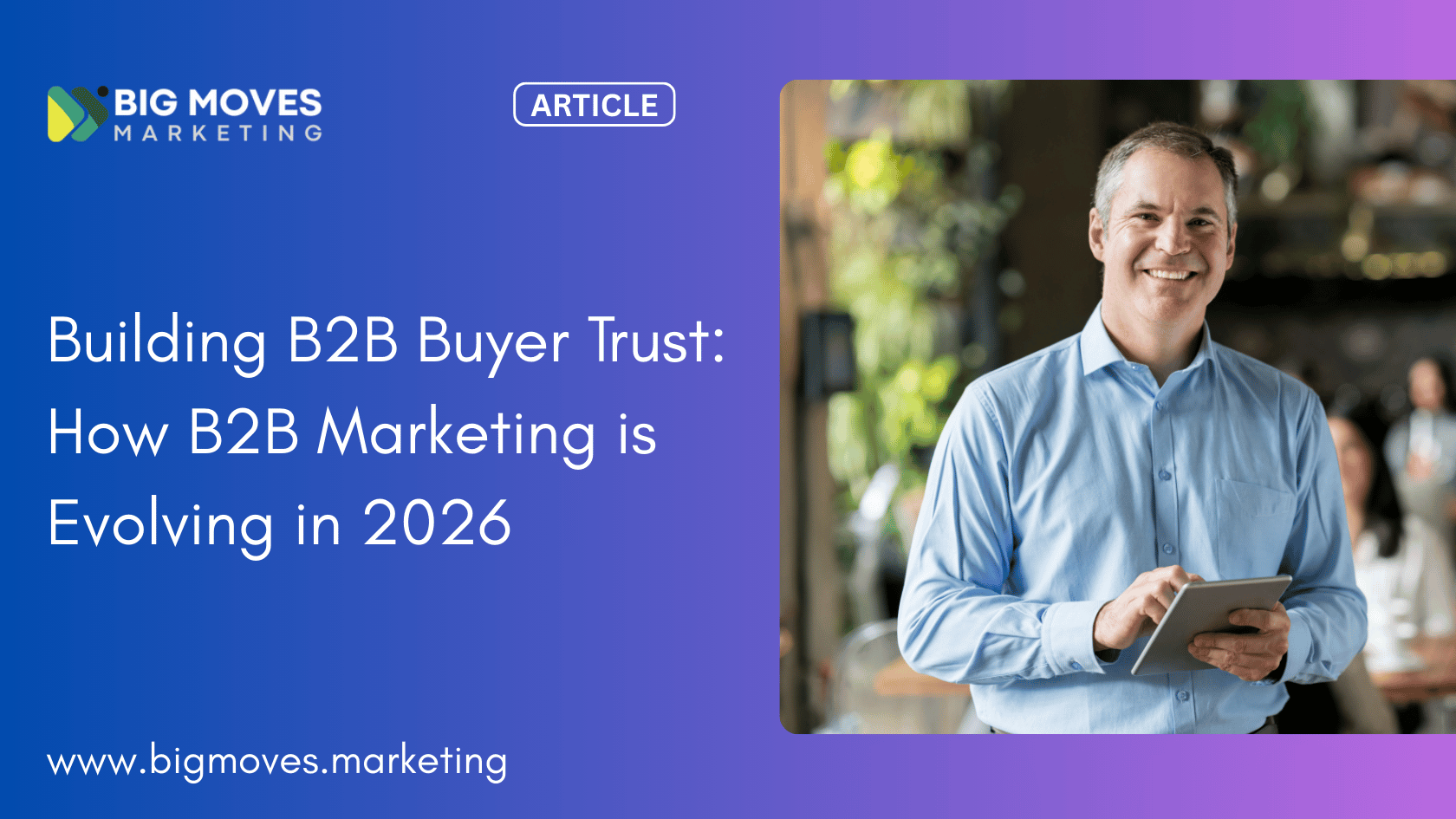Consulting Services for Startups Your Growth Playbook

As a founder, you're expected to be an expert in everything from product development to marketing to sales. It’s an impossible job. But when you hit a challenge that could make or break your entire company, that's when specialized expertise becomes your secret weapon. This is where consulting services for startups act as a true force multiplier for your vision.
Your Strategic Edge in a Demanding Market

Picture a founder at a crossroads. Her B2B SaaS platform is brilliant, but sales have completely flatlined. The team is stretched to its breaking point, and the next funding round hinges on showing investors a clear, believable path to scalable growth.
This isn't a time for guesswork. It's a moment for targeted, decisive action.
This is exactly the scenario where an outside expert provides incredible value. Think of a startup consultant not as another expense, but as temporary, high-impact firepower. They are the seasoned co-pilots you bring on board to navigate a specific, tricky part of your journey—whether that’s building a financial model that actually resonates with VCs or architecting a sales process that doesn't fall apart at scale.
Why On-Demand Expertise Matters
For any early-stage B2B company, agility is everything. You simply don't have the time or the budget to hire a full-time executive for every single challenge that pops up.
Consulting offers a flexible solution. It allows you to access C-suite-level knowledge precisely when and where you need it most, helping you sidestep the common—and often fatal—mistakes that sink so many promising startups.
A consultant’s real job is to give you a clear, actionable roadmap based on years of hard-won experience. They’ve seen the exact challenges you're facing before and can guide you past the obstacles, helping you grab growth opportunities you might otherwise miss.
This kind of strategic partnership is about so much more than just advice; it’s about execution. A great consultant doesn't just hand you a 50-page PowerPoint and walk away. They roll up their sleeves and help you implement it, solving immediate problems while building systems that support your company for the long haul.
From Big Picture to Bottom Line
So, what does this look like in practice? Effective consulting translates your ambitious vision into tangible business outcomes. The primary goals for B2B startups almost always boil down to a few key things:
- Define a clear direction: Transforming a broad idea into a focused, step-by-step operational plan that your team can actually execute.
- Accelerate market entry: Building a powerful strategy to reach and convert your ideal business customers. A solid go-to-market strategy for startups is absolutely fundamental for securing early traction.
- Secure critical funding: Crafting a compelling, data-backed story that proves your business model is not just viable but inevitable.
- Build for scale: Implementing the processes, tech, and systems needed to grow your operations without descending into chaos.
Ultimately, engaging the right consulting services for startups is an investment in clarity, speed, and sustainable growth. It’s about bringing in a specialist who can help you make the right moves at exactly the right time.
Core Services That Fuel Startup Momentum
Moving from a big-picture vision to a functional, high-growth B2B business takes a specific set of skills and systems. This is where the theory behind consulting gets real. The right consulting services are designed to build operational muscle, lock down capital, and create a repeatable engine for finding and keeping customers.
We’ve all heard the grim statistic that 9 out of 10 startups fail. But what’s less talked about is how many of the successful ones get a little help along the way. Founders often bring in experts for business planning, figuring out how to enter a new market, investor relations, and technology—places where an outside perspective can mean the difference between stalling out and taking off.
Strategic Business Planning
A brilliant idea isn't a business plan. A consultant’s first job, more often than not, is to help translate that flash of genius into a concrete, step-by-step roadmap for your business. They bring a crucial objective view to pressure-test your assumptions and carve out a clear path forward.
This process usually involves:
- Clarifying Your Value Proposition: Nailing down the fundamental question of what problem you solve and for which businesses. It’s about making sure your solution actually resonates with the companies you want to sell to.
- Defining Key Milestones: Breaking down your massive, long-term goals into achievable quarterly and annual targets that the whole team can get behind.
- Resource Allocation: Creating a realistic plan for how to spend your limited time, money, and people for the biggest possible impact.
This is all about connecting your core idea to the essential parts of a business that actually make it work, as shown below.

As you can see, a strong value proposition is the foundation. It directly shapes both how you spend money (your cost structure) and how you plan to make it (your revenue streams).
Financial Modeling and Fundraising
Investors don't fund ideas; they fund businesses with a compelling, data-backed story. A financial modeling consultant helps you build that story, turning your operational plan into a sophisticated financial forecast that can withstand the intense scrutiny of venture capitalists.
They build the financial story that proves your business model is not just a dream but a well-calculated investment. It’s about showing investors a believable path to an attractive return.
These models are absolutely critical for securing the capital you need to scale. They prove you have a deep understanding of your unit economics, cash flow, and long-term growth potential.
Go-to-Market Strategy
Having a great product is only half the battle. A go-to-market (GTM) consultant specializes in the other half—building a scalable engine to acquire customers. They help you pinpoint your ideal customer profile and then figure out the most effective ways to actually reach them.
For B2B startups, choosing the right marketing channels is a critical decision that shapes your entire sales motion. An effective content strategy is also a huge piece of this puzzle; for a deeper dive, check out a complete guide to content marketing for startups.
Operational Scaling
Rapid growth can easily turn into chaos without the right systems. The processes that worked when you were a team of five will break when you hit fifty. An operations consultant focuses on building the infrastructure needed to scale your business smoothly.
This means putting things like CRM systems in place, establishing repeatable sales processes, and creating customer support workflows. The goal is to ensure a consistent, high-quality experience for all your business clients as your company grows.
To wrap up this section, let's look at how these core services translate into tangible results. The table below summarizes the key service areas and the real-world impact they deliver for a growing startup.
Key Consulting Services and Their Impact
Ultimately, each of these services is about building a strong foundation, allowing you to focus on innovation while ensuring the business itself is built to last.
Why Niche Experts Outperform Large Firms

When founders hear "consulting," they often picture a massive firm with a gleaming office tower and an eye-watering price tag. But for B2B startups, the real game-changers aren't the giants; they're the smaller, specialized partners. The most effective consulting services for startups usually come from boutique firms and independent experts who live and breathe your specific industry.
Think of it like this: a large, generalist firm is a cruise ship. It's powerful and has a ton of resources, but it turns slowly and offers a standard, one-size-fits-all experience. A niche consultant, on the other hand, is a speedboat—agile, fast, and built to navigate the unique and often choppy waters your startup is facing.
These focused experts deliver high-impact skills without the layers of corporate overhead. This makes world-class strategic advice accessible and genuinely effective for founders who need to move fast and make smart decisions.
The Power of Dedicated Focus
The single biggest advantage of working with a niche expert is their incredibly deep, concentrated knowledge. They aren’t trying to be everything to everyone. Instead, they've spent their entire careers mastering a specific domain, whether that’s B2B SaaS pricing, fundraising for AI companies, or building go-to-market strategies for deep tech.
This specialization means they've seen the exact challenges you’re facing dozens of times before. They come to the table with proven patterns, battle-tested playbooks, and a network of contacts tailored to your world. That’s a massive leg up when you need solutions that aren't just theoretically sound but have actually worked in a market just like yours.
A well-chosen partner can have a remarkable impact on growing your business faster because they apply this focused experience directly to whatever is holding you back.
Instead of spending weeks getting up to speed on your industry, a niche consultant hits the ground running on day one. Their value is immediate because their expertise is already aligned with your business reality.
Agility and Personal Investment
Boutique firms and independent consultants offer a level of personal attention and agility that large organizations simply can't match. It might surprise you, but the consulting world is dominated by small players—a staggering 75% of consulting firms globally have fewer than five employees. These small, dedicated teams are the industry's backbone precisely because their model is built for deep, hands-on engagement.
What’s more, 58% of consultants work with six or fewer clients per year. This allows for an incredibly personal level of service, which is critical for startups that need close collaboration and the ability to pivot quickly. You can explore more data about the future of consulting to see just how prevalent this focused model has become.
This means you’re not just another account number; you’re a key partner. The person who pitches you is almost always the same person doing the work, which guarantees a direct line of communication and a genuine investment in your success. This close relationship allows them to adapt strategies in real-time as the market or your priorities shift—an absolutely essential capability in the startup world. For founders, that direct partnership is invaluable.
How to Find and Vet the Right Partner
Picking a consultant is one of the most critical hiring decisions a founder will make. This isn't just about finding someone with a polished resume; it's about bringing on a strategic partner who can genuinely put your B2B startup on a faster growth trajectory. This requires a framework that goes well beyond a quick reference check.
The whole process has to start with clarity on your end. Before you even think about looking, you need to nail down exactly what you need help with. Is it building a bulletproof financial model for your Series A? Architecting a repeatable sales process that actually scales? Or mapping out a go-to-market strategy for a brand new product?
A vague problem statement will always attract vague, ineffective solutions. The single most important step is to clearly define the challenge and what a successful outcome looks like.
Once you have a crystal-clear objective, your search becomes infinitely more targeted. You can skip the noise and start exploring the specific platforms and networks where top-tier consultants actually spend their time.
Where to Discover Top Talent
Finding the right consulting services for startups means looking in places built for B2B discovery, not scrolling through general job boards. You want to focus your search on platforms that curate and verify their talent, which is a massive shortcut to quality.
- Industry-Specific Networks: Your first stop should always be your own professional network. Tap into the hive mind—ask other founders, your investors, and advisors for their trusted recommendations. A warm intro is worth its weight in gold.
- Curated Marketplaces: Platforms like Toptal or Catalant are great because they do the initial heavy lifting for you. They rigorously vet their experts, so you're starting with a pre-screened, high-quality talent pool.
- Review Platforms: Don't underestimate the power of transparent, client-based feedback. Websites dedicated to B2B service provider reviews can offer a brutally honest look at a consultant's track record.
For instance, platforms like Clutch provide aggregated client reviews and detailed ratings for consulting firms that specialize in startups. It’s a data-driven way to kick off your research and see who’s actually delivering results.
This kind of verified social proof helps you quickly build a shortlist of candidates who have a proven history of success with companies just like yours. At the end of the day, this process has a lot in common with other types of talent acquisition. For a broader look, you can check out our guide on how to hire freelancers for a startup.
Vetting for True Expertise and Fit
Once you’ve got a shortlist, the real work begins. This is where you dig past the credentials on a LinkedIn profile and assess true strategic and cultural fit. You need to make sure a candidate has not only the technical chops but also the right mindset to mesh with your team.
Here are a few critical questions to drive your conversations:
How will you measure the success of this project? A great consultant will practically insist on defining clear, measurable goals from day one. You’re looking for answers that tie directly to business outcomes, like revenue growth, lead conversion rates, or hitting fundraising milestones—not just "delivering a report."
Describe a time a project went off-track and how you handled it. This question cuts right to the chase. It reveals their real-world problem-solving skills, their honesty, and how they navigate the unexpected bumps that are an everyday reality in startup life.
What is your process for integrating with our team? Their answer here should scream collaboration. A top consultant will be focused on working with your team to build skills and systems, not just dropping off a deliverable and disappearing. They should be invested in making your team smarter and more capable long after they're gone.
Running a tight, rigorous vetting process like this will give you the confidence to make a strategic decision, ensuring you bring on a partner who will be a genuine asset on your company's journey.
The Modern Approach to On-Demand Expertise
The old-school image of a consultant—someone from a big firm on a long, expensive retainer—is quickly becoming a thing of the past. For B2B startups, that model just doesn't work. A much smarter, more agile approach has taken its place. Today's market is all about on-demand expertise, a shift that has made top-tier strategic advice more accessible than ever.
This evolution means you can bring in specialized, high-caliber talent for specific, make-or-break projects without the long-term commitment or eye-watering cost of a full-time executive. It fundamentally levels the playing field, giving early-stage companies access to the same kind of strategic minds once reserved for Fortune 500 boardrooms.
The Rise of Fractional and Project-Based Engagements
The biggest change is the move toward flexible ways of working together. Instead of locking into a year-long retainer, startups can now hire an expert for a single, tightly-defined project. This could be anything from building a financial model for your Series A deck, to designing a go-to-market plan, or completely overhauling your sales process.
This project-based model keeps you in the driver's seat. It ensures every dollar you spend is tied directly to a tangible business outcome, making it an investment in a specific result rather than just another operational cost.
The core idea is simple but profound: you buy the specific outcome you need, not just someone's time. This model is built for the speed and focus that startups require to win.
Another model gaining huge traction is the fractional executive. Here, a startup gets the brainpower of a seasoned leader—like a Chief Marketing Officer or Chief Financial Officer—for a fraction of their time and cost. For a deeper dive, our guide on the role of a fractional CMO for startups breaks down how this gives you high-level strategic direction without the full-time salary.
Digital Platforms Are Accelerating the Shift
This new era of on-demand talent is being supercharged by digital platforms that connect companies with vetted, world-class experts. These marketplaces make it faster and easier than ever to find the exact skills you need, precisely when you need them.
And this isn't just a hunch; the data backs it up. Recent findings show that 40% of senior leaders report measurable gains in speed, productivity, and innovation when they bring in on-demand experts. The message for founders is crystal clear: consulting is no longer an exclusive club but a dynamic, accessible resource for scaling efficiently.
You can discover more consulting statistics and trends that show how this shift is reshaping the entire industry. Today's consulting market is a flexible, powerful tool you can use to gain a significant operational advantage.
Got Questions About Startup Consulting? Let's Clear a Few Things Up.
Even after you're sold on the idea, bringing in outside help for the first time feels like a huge step. It's totally normal to have questions swirling around about how it works, what it costs, and what the real-world results look like. I get it.
So, let's tackle the big questions I hear most often from B2B founders. These aren't just academic points; getting these right is what separates a wildly successful consulting project from a frustrating waste of money. We'll cut through the noise and get straight to what matters.
When Is the Right Time to Hire a Consultant?
The perfect time to bring in a consultant is right before a major turning point for your startup. This is when you're staring down a high-stakes challenge where your current team just doesn't have the specific, deep-seated experience to nail it. Think of it less like calling the fire department and more like hiring an architect before you build the house.
Here are a few classic triggers:
- You're prepping for a fundraise: You need a financial model that can survive the brutal scrutiny of venture capitalists.
- You're breaking into a new market: You need a go-to-market plan that's built on experience, not just educated guesses.
- Your operations are starting to crack: The processes that got you here are breaking as you grow, and you need to build systems that can actually scale with you.
Making the move before a problem becomes a full-blown crisis gives you the breathing room to implement a smart, effective solution. This is how you use consulting services for startups to build momentum, not just plug leaks.
How Should We Actually Budget for This?
This is a big one. You have to stop thinking about consulting as just another line item expense, like software or office snacks. Frame it as an investment tied directly to a specific business outcome. Before you even think about the cost, define the tangible value you're aiming for. What is that bulletproof financial model or that validated GTM strategy really worth to your business?
Forget about hourly billing. That model is a relic. Modern consulting is shifting toward project-based fees or monthly retainers. This gives you predictable costs and, more importantly, aligns everyone around delivering the final result, not just logging hours.
This approach changes the entire conversation. It moves from "How long will this take?" to a much more powerful question: "What is the value of the outcome we're building together?"
What’s the Difference Between a Consultant and an Advisor?
This is a critical distinction, and one that trips up a lot of founders. They are fundamentally different roles, and knowing which one you need is key to getting the right kind of help.
- A consultant is a hands-on "doer." You hire them for a specific project with a crystal-clear deliverable and a defined timeline. Their job is to roll up their sleeves and get something done—like building out your sales playbook or creating your investor deck.
- An advisor, on the other hand, is a "guide." They offer high-level strategic advice over a much longer period, often for a small slice of equity. They’re a sounding board for the leadership team, offering wisdom from their experience and opening up their network.
Put simply: consultants are hired to solve defined, immediate problems. Advisors are brought on for ongoing guidance.
How Do We Make Sure We Get a Positive Return on Investment?
A positive ROI doesn't happen by accident. It starts by defining what "success" looks like before the project even kicks off. A great consultant will insist on this, working with you to set specific, measurable outcomes from day one. What does a "win" actually look like in concrete terms?
Is it closing a funding round of a certain size? Is it boosting lead conversion by 15%? Or maybe it's cutting customer churn by 20%?
These aren't just goals; they're the metrics you'll agree on and track. A top-tier consultant will be just as obsessed with proving their value as you are with seeing it, ensuring the investment pays for itself many times over.
At Big Moves Marketing, I focus on providing the hands-on strategic execution that B2B startups need to win. From positioning and messaging to building the sales tools that close deals, I partner with founders to turn great products into market leaders. Learn more at https://www.bigmoves.marketing.
%20png%20copy.png)






%20-%20white.svg)
